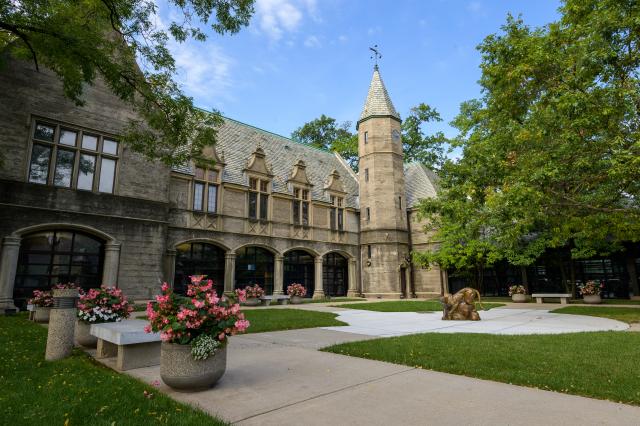Kean’s Watson Institute Secures $2.7 Million Grant to Lead Climate Resilience and Equity Initiatives in New Jersey

The John S. Watson Institute for Urban Policy and Research at Kean University will receive $2.7 million for “green infrastructure” and climate resilience initiatives in New Jersey, part of a statewide $72 million grant from the National Oceanic and Atmospheric Administration (NOAA).
The Building a Climate Ready NJ initiative, funded by the five-year grant to the state Department of Environmental Protection, has a strong focus on supporting and engaging with disadvantaged and overburdened communities. The Watson Institute will play a leading role in working to advance equity and support for underserved communities.
“As New Jersey’s premier urban research university and a vital anchor institution, Kean is prepared to lead the way in climate resilience through the Watson Institute,” said Kean President Lamont O. Repollet, Ed.D. “By focusing on environmental justice and research in our coastal communities, we are anchoring down and committing to build a climate-ready New Jersey. Kean will help ensure every community has the resources and solutions necessary for a sustainable future.”
The Watson Institute’s work will include coordinating implementation of a Green Infrastructure Training and Entrepreneurship initiative, focused on disadvantaged communities; and gathering and integrating input from community stakeholders. Other partners in the project include Rutgers University and the New Jersey Environmental Justice Alliance.
Kean Senior Vice President for Transformational Learning and External Affairs Joseph Youngblood II, Ph.D., said the grant highlights Kean’s leadership role in environmental justice, community capacity development and engagement.
"The John S. Watson Institute will address the critical issue of climate resilience while enabling underserved communities to create customized solutions,” he said. “Our participation in this initiative is crucial, and we're eager to utilize the comprehensive resources of New Jersey's sole urban research university. We look forward to working with partners statewide to construct a more robust, climate-resilient future for New Jersey."
Barbara George Johnson, Kean’s vice president of External Affairs, said the Institute is proud to be part of the project.
“Kean University and the John S. Watson Institute are deeply committed to advancing equity and uplifting underserved communities,” she said. “This initiative enables us to create real, sustainable change by equipping community organizations with the knowledge and tools to address climate vulnerabilities and take action toward a more resilient future. With this funding, we are poised to strengthen our partnerships and make a meaningful impact across New Jersey’s coastal regions.”
Nicky Sheats, Ph.D., director of the Center for the Urban Environment at the Watson Institute, cited the impact of the funding.
"This funding from NOAA should allow the grant partners to help New Jersey communities fight the detrimental impacts of climate change," he said.
The $72 million grant is part of a total $575 million allotted nationwide through NOAA’s Climate Resilience Regional Challenge. The New Jersey project will increase the resilience of the state’s coastal and riverfront communities to extreme weather and climate change impacts, including sea-level rise.
The Watson Institute comprises integrated policy centers and initiatives that support informed public policy. The Institute serves as a vital, non-partisan resource for New Jersey decision-makers, supporting development and implementation of real-world solutions.
As part of its work on the project, the Watson Institute will collaborate with the New Jersey Environmental Justice Alliance to develop a model for green infrastructure training for community organizations; facilitate listening sessions to gather feedback; and host follow-up sessions.
"We are excited to work with Kean University, DEP, and our communities to increase coastal and flood water resilience,” said Melissa Miles, executive director of the Alliance. “We look forward to the opportunity to facilitate community engagement and ensure that we prioritize equity throughout this initiative."
The Watson Institute will also recruit participation for a National Green Infrastructure Certification Program, to support small businesses in disadvantaged, overburdened communities, and increase their ability to compete for contracts related to green infrastructure.